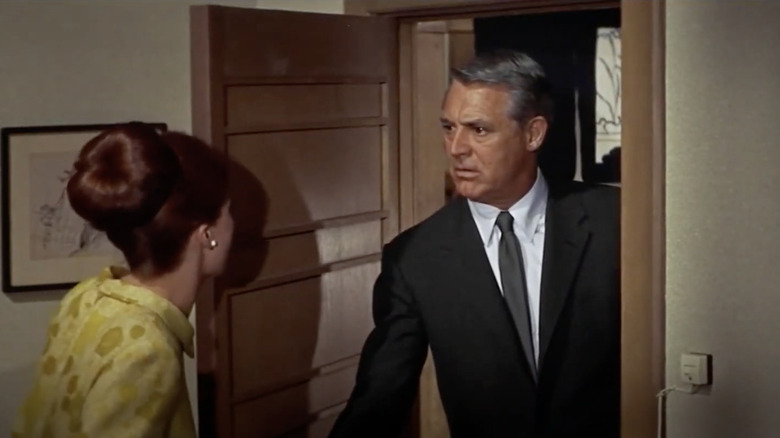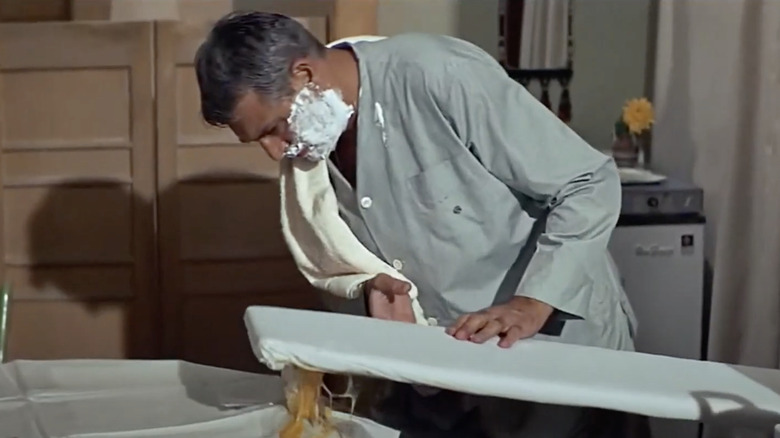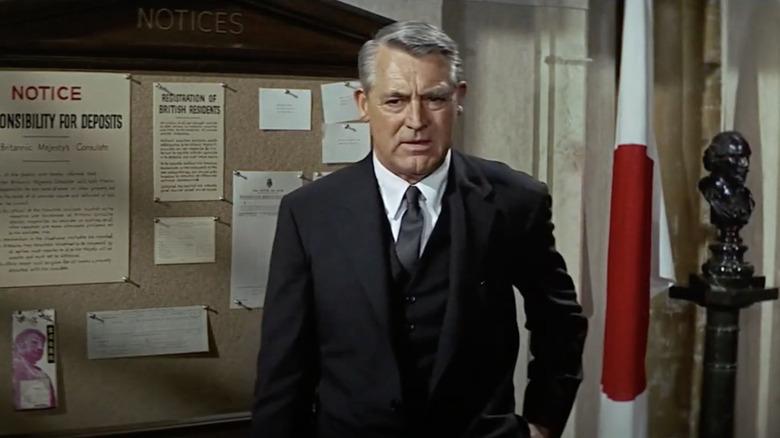Cary Grant's Fame Caused Some Headaches While Filming Walk, Don't Run
The life of a celebrity might be glamorous, but it's far from easy. Sure, you might get some extra love at your local pizza parlor (especially if you impersonate Ben Affleck), but being famous means that you're highly recognizable — and lots of people want to meet you. Good luck having normal public outings.
While celebrities nowadays might use the occasional disguise to briefly enjoy anonymity (Mark Ruffalo and Jared Leto have worn costumes to enjoy New York Comic-Con incognito), Cary Grant had to brave the mobs while filming "Walk, Don't Run" in Tokyo. According to the late screenwriter Sol Saks, the actor's impressive height made him even more noticeable, too. Grant was 6'1", whereas the average 20-year-old Japanese man was roughly 5'4" around the time. Saks said:
"He couldn't go out of the hotel because he'd get swarmed. I saw it. He happened to stop [when we were] coming from the dailies, and we stopped at the entrance to the hotel to say something, and within 30 seconds, there's a crowd around him because he was tall in Japan."
Life in the spotlight isn't always fun
Being famous made Grant's daily life far more difficult while filming "Walk, Don't Run." Saks recalled that the actor didn't want to eat at restaurants outside their hotel, and that even in the hotel's restaurants, he would always request a corner table so that he could eat while facing the wall — "every time you lift your head, all eyes are on you." As if that weren't bad enough, Grant always had to keep moving, too:
"He couldn't stand still for 30 seconds without being mobbed, and it's not pleasant. Cary Grant didn't need it."
Understandably, Grant wasn't a fan of non-stop attention, whether at home or abroad. In fact, he was so frustrated by it that when journalist Diane K. Shah wrote an article about how baseball player Reggie Jackson couldn't get through a restaurant meal without being bombarded by fans, Grant called her up to say that he felt the exact same way.
The chat led to a friendship, and Grant eventually shared that he always "deplore[d]" being impolite to fans, but struggled with the constant attention (understandably so, especially since some of the comments ventured into harassment territory). Still, as he told Shah, he tried to keep a sense of humor when dealing with intruding fans:
"I'll be having dinner and a man will appear with a pen and paper and say, 'I hate to do this but....' And I'll say, 'Oh, don't do anything you hate! That's terrible.' Or sometimes the poor fellow will be so flustered, he'll say, 'You know, you're my greatest fan.' And I'll say, 'Well, I don't know how long I will be!'"
A monkey's paw wish come true
It's never fun to be bombarded with unwanted attention, but considering Grant's original aspirations, his treatment in Tokyo was especially tragic. As Grant had told Shah, he had always dreamed of travel and ultimately became an actor so that he could see different parts of the world:
"I was too young to be a commercial traveler. I was too young to join the army. But all I dreamed of was to travel. ... I noticed actors in the cast of these vaudeville shows who were as young as I am. I thought, 'My God, actors travel.'"
Unfortunately, as anyone who's had a long airport layover can tell you, physically being in a new location doesn't mean that you get to enjoy it. Grant may have visited Tokyo to film "Walk, Don't Run,", but if he spent the majority of his time hiding in the hotel, how much of the city did he really get to experience? To make matters worse, all of Grant's trips — both work and personal — were at risk of being ruined by his celebrity status. The actor may have earned his cake, but he didn't get to eat it.


